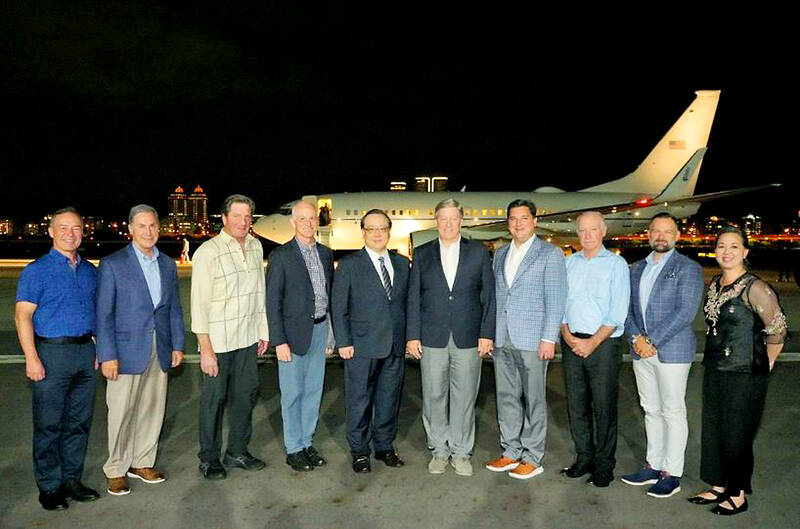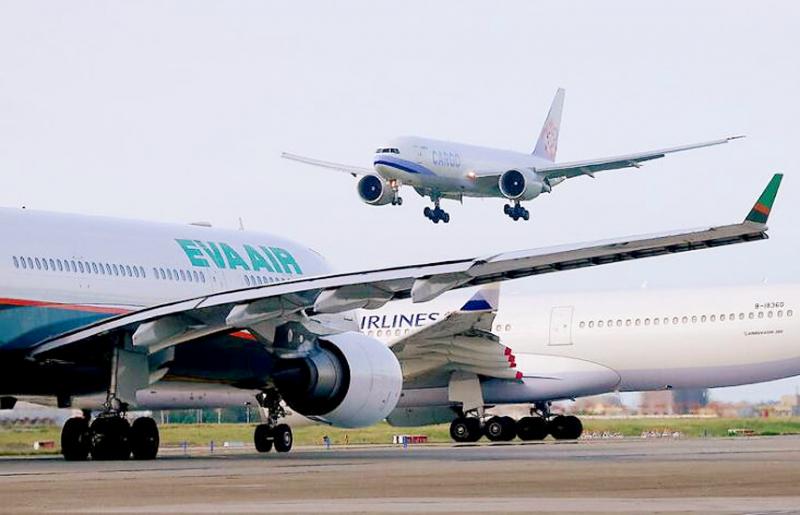The military would for the first time use the nation’s main airport for a simulation of local troops repelling Chinese paratroopers during next month’s Hang Kuang exercises, a defense official said on condition of anonymity yesterday.
The drill, planned for July 26, would mark the first time a counter-airborne assault drill is staged at Taiwan Taoyuan International Airport, the official said.
The army’s special forces would assume the role of aggressor in the exercise, while regular ground forces would act as the defenders, the official said.

Photo courtesy of the Ministry of Foreign Affairs
Flights would be suspended for an hour during the exercise, and the Ministry of National Defense would inform airlines and civil aviation authorities about the details at an appropriate time, the official said.
This year’s Han Kuang military exercises are to take place from July 24 to 28.
The live-fire component of the military exercises next month would also for the first time hold an emergency landing and takeoff drill at a civilian airport in Taitung County, and would involve the use of F-16 jets and C-130H Hercules transport aircraft, a military source said on Saturday.

Photo: Taipei Times
The drill will be staged at Taitung Fengnian Airport, which opened in 1981.
The purpose of the drill is to test Taiwan’s civilian airports and emergency landing strips to make sure they are capable of handling takeoff and landing missions in wartime, the source said.
In other news, the military yesterday reiterated that it would strike Chinese warships and warplanes in defense if they were detected within Taiwan’s 12-nautical-mile (22.2km) territorial space.
The comment came after Chinese warplanes on Saturday were spotted flying close to the airspace under Taipei’s control for the first time in six months.
The ministry said that 19 Chinese warplanes were detected around Taiwan from 6pm on Friday to 6am on Saturday, including an unspecified number of J-10 and J-16 fighters.
Among the 19, eight crossed the median line of the Taiwan Strait and approached the outer boundary of the contiguous zone, which is 24 nautical miles from Taiwan’s shore.
Although the Chinese People’s Liberation Army has frequently sent planes and ships in the vicinity of Taiwan and flown over the median line, it rarely sends them near Taipei’s contiguous zone.
In other news, Mike Rogers, chairman of the US House of Representatives’ Committee on Armed Services, arrived last night in Taiwan for a three-day visit, the Ministry of Foreign Affairs said.
Rogers, a Republican, is leading a bipartisan congressional delegation that includes Democratic US representatives Adam Smith, Joe Courtney, John Garamendi and Jill Tokuda, and Republican US representatives David Rouzer, Gary Palmer, James Moylan and Corry Mills.
President Tsai Ing-wen (蔡英文) extended her welcome to the US legislators and is to receive the delegation this afternoon, Presidential Office spokeswoman Kolas Yotaka said last night.
The Tsai administration hopes that the US lawmakers’ visit will facilitate a deepening of trade and security ties between Taipei and Washington, and contribute to peace and stability in the Indo-Pacific region, she said.

AIR SUPPORT: The Ministry of National Defense thanked the US for the delivery, adding that it was an indicator of the White House’s commitment to the Taiwan Relations Act Deputy Minister of National Defense Po Horng-huei (柏鴻輝) and Representative to the US Alexander Yui on Friday attended a delivery ceremony for the first of Taiwan’s long-awaited 66 F-16C/D Block 70 jets at a Lockheed Martin Corp factory in Greenville, South Carolina. “We are so proud to be the global home of the F-16 and to support Taiwan’s air defense capabilities,” US Representative William Timmons wrote on X, alongside a photograph of Taiwanese and US officials at the event. The F-16C/D Block 70 jets Taiwan ordered have the same capabilities as aircraft that had been upgraded to F-16Vs. The batch of Lockheed Martin

GRIDLOCK: The National Fire Agency’s Special Search and Rescue team is on standby to travel to the countries to help out with the rescue effort A powerful earthquake rocked Myanmar and neighboring Thailand yesterday, killing at least three people in Bangkok and burying dozens when a high-rise building under construction collapsed. Footage shared on social media from Myanmar’s second-largest city showed widespread destruction, raising fears that many were trapped under the rubble or killed. The magnitude 7.7 earthquake, with an epicenter near Mandalay in Myanmar, struck at midday and was followed by a strong magnitude 6.4 aftershock. The extent of death, injury and destruction — especially in Myanmar, which is embroiled in a civil war and where information is tightly controlled at the best of times —

Taiwan was ranked the fourth-safest country in the world with a score of 82.9, trailing only Andorra, the United Arab Emirates and Qatar in Numbeo’s Safety Index by Country report. Taiwan’s score improved by 0.1 points compared with last year’s mid-year report, which had Taiwan fourth with a score of 82.8. However, both scores were lower than in last year’s first review, when Taiwan scored 83.3, and are a long way from when Taiwan was named the second-safest country in the world in 2021, scoring 84.8. Taiwan ranked higher than Singapore in ninth with a score of 77.4 and Japan in 10th with

SECURITY RISK: If there is a conflict between China and Taiwan, ‘there would likely be significant consequences to global economic and security interests,’ it said China remains the top military and cyber threat to the US and continues to make progress on capabilities to seize Taiwan, a report by US intelligence agencies said on Tuesday. The report provides an overview of the “collective insights” of top US intelligence agencies about the security threats to the US posed by foreign nations and criminal organizations. In its Annual Threat Assessment, the agencies divided threats facing the US into two broad categories, “nonstate transnational criminals and terrorists” and “major state actors,” with China, Russia, Iran and North Korea named. Of those countries, “China presents the most comprehensive and robust military threat